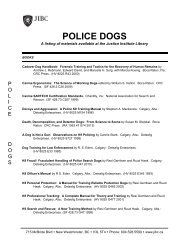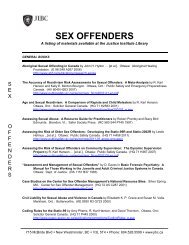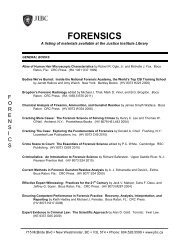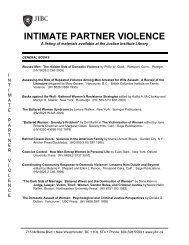legally speaking - Justice Institute of British Columbia
legally speaking - Justice Institute of British Columbia
legally speaking - Justice Institute of British Columbia
Create successful ePaper yourself
Turn your PDF publications into a flip-book with our unique Google optimized e-Paper software.
At trial in <strong>British</strong> <strong>Columbia</strong><br />
Supreme Court the accused<br />
was convicted <strong>of</strong> first degree<br />
murder by a jury. He did not<br />
deny participating in the<br />
murder, but argued that it<br />
wa s n o t p l a n n e d a n d<br />
deliberate. The evidence <strong>of</strong><br />
the accused’s statements and the re-enactments was<br />
admitted. He then appealed to the <strong>British</strong> <strong>Columbia</strong><br />
Court <strong>of</strong> Appeal challenging the admissibility <strong>of</strong> his<br />
statements and the re-enactments. He argued,<br />
among other grounds, that he should have been<br />
given further s. 10(b) Charter advice before being<br />
shown the video clip <strong>of</strong> his statement to the<br />
undercover <strong>of</strong>ficer and again before being asked to<br />
participate in the re-enactments. As well, he<br />
contended that after the JJP hearing he was in the<br />
custody <strong>of</strong> the court and the police could no longer<br />
interview him without again giving him s. 10(b)<br />
rights.<br />
Right to Counsel<br />
The Court <strong>of</strong> Appeal concluded that the accused was<br />
not required to be given another opportunity to<br />
contact counsel before being confronted with the<br />
video clip from the undercover operation or before<br />
being asked to participate in the re-enactment.<br />
Neither <strong>of</strong> these events re-triggered the informational<br />
and implementational components <strong>of</strong> s. 10(b)<br />
because they were not new (non-routine)<br />
procedures. When the <strong>of</strong>ficer played the video clip<br />
he “did no more than accurately disclose evidence<br />
the police had already gathered,” said <strong>Justice</strong><br />
Frankel. “The police practice <strong>of</strong> disclosing<br />
information, be it true or false, to encourage a<br />
detainee to talk does not, without more, re-trigger s.<br />
10(b) rights.”<br />
As for the re-enactment, the<br />
accused was re-advised <strong>of</strong> his<br />
right to consult a lawyer and<br />
chose not to do so. Even if he<br />
wasn’t re-advised <strong>of</strong> his right to<br />
counsel, a re-enactment is not to<br />
be considered “a new (nonroutine)<br />
procedure that falls<br />
outside <strong>of</strong> the expectations <strong>of</strong><br />
Volume 11 Issue 1 - January/February 2011<br />
“The police practice <strong>of</strong> disclosing<br />
information, be it true or false, to<br />
encourage a detainee to talk<br />
does not, without more, re-<br />
trigger s. 10(b) rights.”<br />
“A re-enactment is nothing<br />
more than a statement by<br />
conduct. It involves a person<br />
demonstrating, rather than<br />
simply recounting, how events<br />
unfolded.”<br />
PAGE 24<br />
counsel advising a detainee. A reenactment<br />
is nothing more than a<br />
statement by conduct. It involves a<br />
person demonstrating, rather than<br />
simply recounting, how events<br />
unfolded. It can hardly be said, for<br />
example, that [the accused’s]<br />
response to ‘Tell me how you<br />
strangled Mr. Sabine’ is <strong>of</strong> a different character than<br />
his response to ‘Show me how you strangled Mr.<br />
Sabine’.” Furthermore, “even if a re-enactment could<br />
be considered to be a new procedure, a request to<br />
participate in one was not a matter on which [the<br />
accused] required further legal advice,” said the<br />
Court <strong>of</strong> Appeal. “Although [the accused’s lawyer]<br />
did not specifically use the word ‘re-enactment’, he<br />
did counsel [the accused] against participating in a<br />
line-up or a lie detector test, and to be aware that<br />
the police might ask him to participate in some form<br />
<strong>of</strong> ‘test’ as a ruse to get him to talk. Given that<br />
advice and the strong general admonition [the<br />
accused] received with respect to providing any<br />
information to the police, he was in a position to be<br />
able to make a meaningful choice about whether to<br />
participate in the re-enactment.”<br />
The accused also submitted that once an arrestee is<br />
remanded to the custody and supervision <strong>of</strong> the<br />
court and detained, the police must re-advise him <strong>of</strong><br />
his rights in accordance with s. 10(b) before<br />
interviewing him. But the Court rejected this<br />
argument, finding that a remand order did not have<br />
the effect <strong>of</strong> shielding an accused from otherwise<br />
lawful investigative action. “A remand order, by<br />
itself, neither confers new constitutional rights on a<br />
detainee, nor imposes limitations on what lawful<br />
investigative techniques may be used by the police,”<br />
said <strong>Justice</strong> Frankel. And further:<br />
[W]hen [the accused] was interviewed at police<br />
headquarters … he was lawfully<br />
detained, as the warrant <strong>of</strong><br />
committal authorized his<br />
detention at “a police lockup”.<br />
The fact that [the accused] was<br />
questioned in interview rooms<br />
rather than in a cell is, in my<br />
opinion, <strong>of</strong> no consequence. In<br />
the circumstances <strong>of</strong> this case, it<br />
would be drawing too fine a






